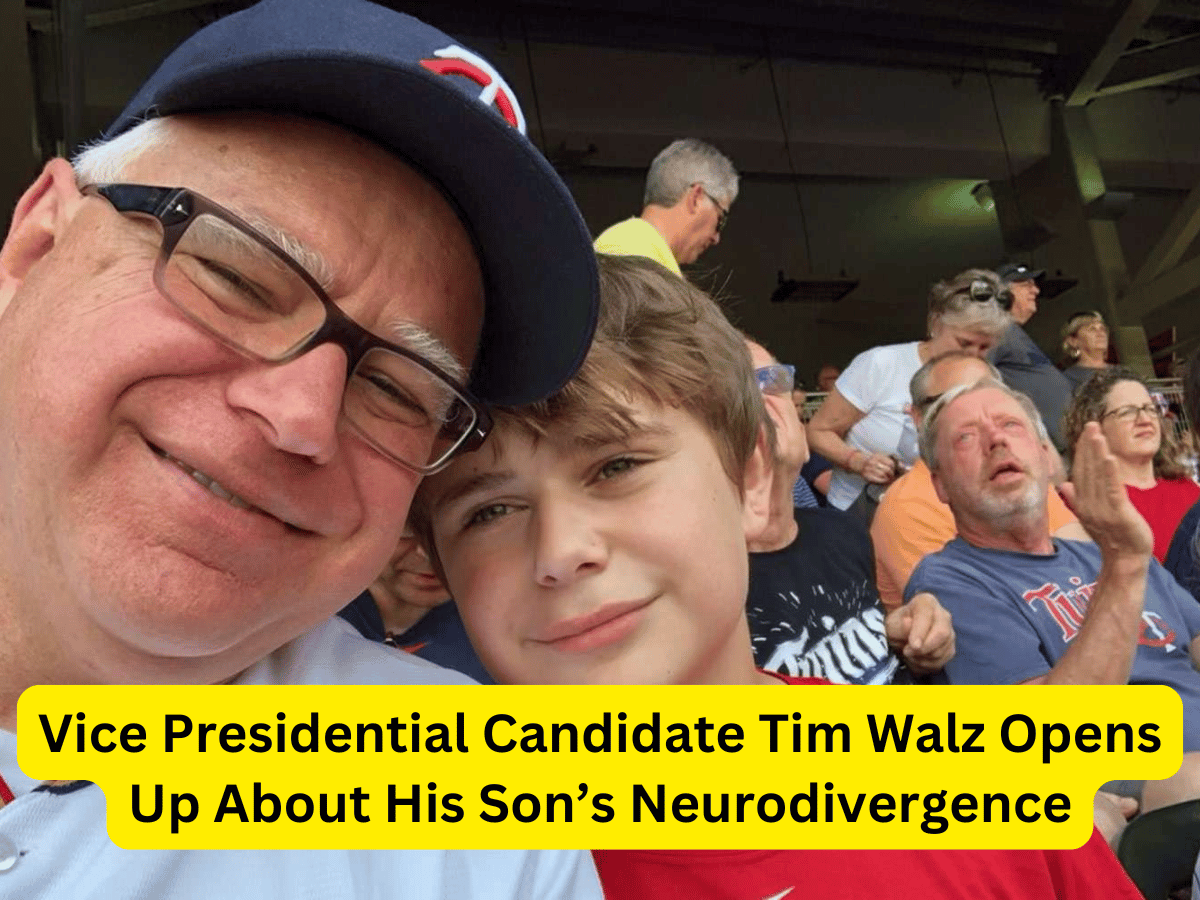Vice Presidential Candidate Tim Walz Opens Up About His Son Gus Walz Neurodivergence: A Story of Love, Advocacy, and Leadership

Tim Walz Opens Up About His Son Gus Walz Neurodivergence: In the world of politics, candidates are often defined by their policies, promises, and public personas. However, for Tim Walz, the Democratic vice-presidential candidate, it’s his personal experiences as a father that have profoundly shaped his outlook on leadership and public service. Recently, Walz opened up about his son’s neurodivergence, offering a rare glimpse into the challenges and triumphs his family has faced. This revelation has struck a chord with many Americans, highlighting not just the complexities of parenting a neurodivergent child but also the importance of inclusive policies that support all families.
What Is a Non-verbal Learning Disability?
A Non-Verbal Learning Disability (NVLD) is a neurological condition that affects a person’s ability to interpret non-verbal cues like body language, facial expressions, and tone of voice. Unlike other learning disabilities that impact verbal skills, individuals with NVLD often have strong verbal abilities but struggle with tasks that require spatial awareness, motor skills, or understanding social interactions.
Key Characteristics:
- Difficulty with Spatial Tasks: Trouble with understanding spatial relationships, such as reading maps or judging distances.
- Poor Motor Coordination: Challenges with fine motor skills, making tasks like writing or cutting difficult.
- Struggles with Social Cues: Difficulty interpreting body language, facial expressions, and social nuances.
- Strong Verbal Skills: Often have advanced vocabulary and strong reading skills but may miss the underlying meaning in conversations.
- Difficulty with Math: Struggles with math concepts, particularly those involving spatial reasoning, such as geometry.
Challenges and Support
People with NVLD may experience anxiety, social isolation, or frustration due to misunderstandings in social settings. Early diagnosis and interventions, such as occupational therapy, social skills training, and academic support, can help individuals with NVLD develop coping strategies and thrive in various aspects of life.
A Personal Journey
Tim Walz’s journey as a parent of a neurodivergent child (Gus Walz) is one marked by love, learning, and resilience. His son, who was diagnosed at a young age, has experienced the world differently than most. Neurodivergence, which encompasses conditions like autism, ADHD, dyslexia, and more, affects how individuals process information and interact with the world. For the Walz family, this meant navigating a path filled with both unique challenges and profound joys.
In sharing his story, Walz emphasized the importance of understanding and acceptance. “My son’s neurodivergence doesn’t define him,” Walz stated in a recent interview. “It’s just one part of who he is. He’s creative, compassionate, and incredibly insightful. Every day, he teaches us to see the world in new ways.”
Advocacy Through Personal Experience
Walz’s candid discussion about his son’s neurodivergence goes beyond just sharing his family’s story—it’s also a call to action. As a former teacher and current Governor of Minnesota, Walz has long been an advocate for education and healthcare reform. His personal experience as a father of a neurodivergent child has only deepened his commitment to these causes. Also read: Grus Brother Net Worth: The Secrets Behind Their Financial Triumph.
“Raising a neurodivergent child has shown me firsthand the gaps in our system,” Walz explained. “From access to specialized education to healthcare that truly meets the needs of all children, there’s so much more we need to do.”
His policy proposals reflect this understanding. Walz has consistently championed initiatives that promote inclusive education, expand mental health services, and provide better support for families with neurodivergent members. He believes that every child, regardless of their neurological makeup, deserves the opportunity to thrive.
Shifting the National Conversation
Walz’s openness about his son’s neurodivergence has sparked a broader conversation about neurodiversity in America. For too long, neurodivergent individuals have been marginalized, their differences misunderstood or stigmatized. By speaking openly, Walz is helping to destigmatize neurodivergence and encouraging others to do the same.
This shift in conversation is crucial. As more public figures like Walz share their experiences, neurodiversity is increasingly being recognized as a valuable aspect of human diversity. Rather than seeing neurodivergence as something to be “fixed,” there is growing recognition of the strengths and perspectives that neurodivergent individuals bring to the table.
Leadership Rooted in Empathy
As a vice-presidential candidate, Tim Walz’s leadership style is deeply informed by his experiences as a father. His empathy, patience, and commitment to inclusivity are qualities that resonate with many voters, especially those who also have neurodivergent family members. In a political landscape often dominated by divisiveness, Walz’s message of understanding and compassion stands out.
“Being a parent has taught me that leadership isn’t just about making decisions—it’s about listening, learning, and supporting those around you,” Walz shared. “My son has been one of my greatest teachers in that regard.”
A Vision for a More Inclusive Future
Looking ahead, Tim Walz’s vision for America is one where every individual, regardless of their neurological differences, is valued and supported. He believes that by creating policies that reflect this vision, the country can become more inclusive, equitable, and compassionate.
For families of neurodivergent children, Walz’s advocacy offers hope. His commitment to improving education, healthcare, and social services reflects a deep understanding of the challenges these families face. More importantly, it sends a powerful message: that every child, neurodivergent or not, has the potential to contribute meaningfully to society.
Who is Hope Walz?
Hope Walz, the daughter of Tim Walz, has emerged as an inspiring figure in her own right. Known for her advocacy and compassion, she reflects the values of resilience and empathy that her family holds dear, making her a role model for young activists seeking to make a difference.
Conclusion
Tim Walz’s decision to open up about his son’s neurodivergence is more than just a personal revelation—it’s a bold step toward changing how society views and supports neurodiversity. As he continues his campaign for the vice presidency, Walz’s message of empathy, inclusivity, and understanding will likely resonate with many voters, offering a compelling vision for a future where everyone is given the opportunity to thrive.




